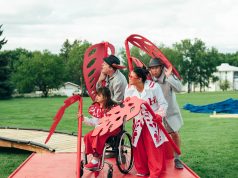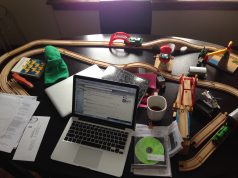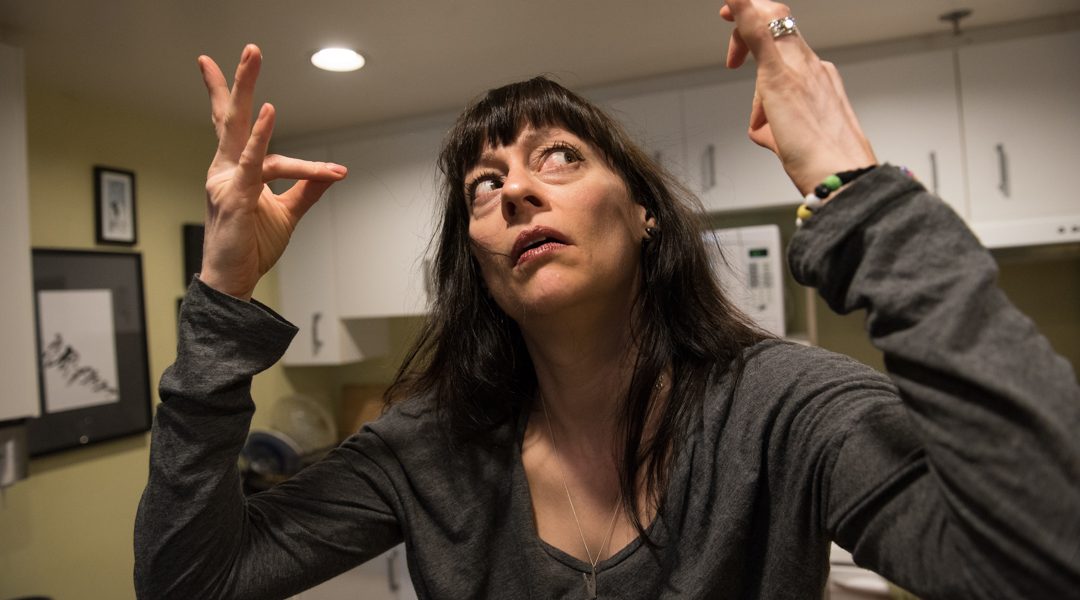
Making dances with talking, and plays with moving does not actually feel like hybridization to me. It feels perfectly natural, even though I don’t see a lot of other creators working this way. My mentors Denise Clarke (One Yellow Rabbit) and the late Nigel Charnock (co-founder of DV8 Physical Theatre) have been talking and dancing for decades.
I get a lot of questions about how I work and what I make. People ask; Is it dance? Is it theatre? Is it comedy? Is it drama? Why do you have to talk? Why do you have to move so much? Why are you so weird? I never understood that I had to pick a team and stick to it.
What follows are four arguments to answer these questions.
Background:
I’ve always been like this. I made jokes in ballet class. I put a little Juliet soliloquy in the recital at The Royal Winnipeg Ballet Summer school. I choreographed my monologues in theatre school and narrated my choreography assignments in university. I like dance without talking when other people do it and theatre without much movement (although theatre could use physical literacy in general – just saying). But when I think I move and when I move I talk.
Argument #1:
When most people think about dance, they think of athleticism and form (eg: the ballet, and So You Think You Can Dance). But I don’t think about bodies and dance that way.
All movement is dance to me.
I try to meet the people I work with, professional dancers or otherwise, where they are. Including myself and my questions. When I work with other artists there’s a lot of talking a lot of asking them to improvise, a lot of “what’s your favourite song let’s dance to it” so they can find their own impulses.
It’s about finding our emotional connection to our movement.
Argument #2:
Stories seem to live deep in my body and I can only get to them by moving.
I don’t go away and sit and write. It all happens in the room (the studio) where I’m working, from improvisation, from what is interesting to me in that moment. I dance to songs I like and try to find what (sometimes who) is happening in my body. I talk to myself about the shit that’s on my mind – the irritating “other” moms at my kid’s school (who wears gold stilettos to pick up their kid?) for example.
I’m always relating everything I’m doing back to whatever the questions are that keep coming up, about whatever I’m obsessing about at the time (eg. Why do we all love crime drama? What is faith? Why do 40+ women feel invisible? Why can’t I remember the word for I can’t remember?). With, How To Be (my most recent ensemble piece/play/show), I’d been noticing how we all seem to ask in one way or another, how should I be? How should I speak? How much should I weigh? What should I wear? You know questions and listicles of answers that come up on our FaceBook feeds.
We all tell innumerable tales about ourselves and our experiences through our movements, gestures, postures, and physical rhythms and that’s also how I find words and characters and story.
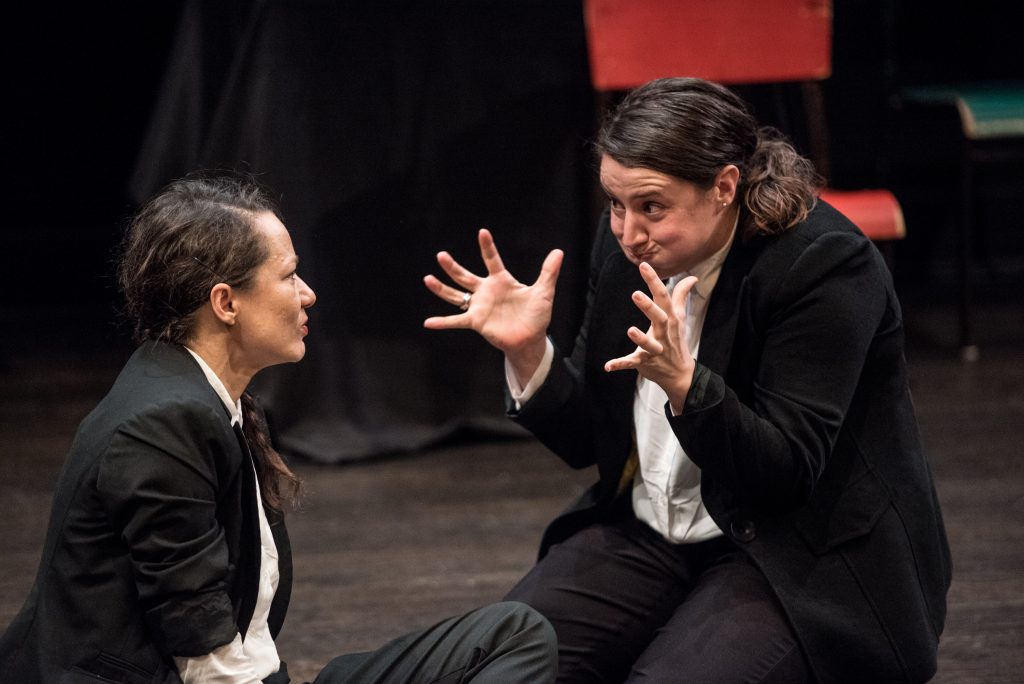
Argument #3:
I trust that what I’m doing, that the way I’m working, is in service of story and character, and the body in “dance” or movement of any kind will say what it needs to say, with or without words.
Our bodies betray our words. We might say, “I feel great,” but our chest is collapsed and our fists are held tight. I believe the body is the loudest subtext we can have. Dance for me takes over when words fail to uncover what needs to be communicated or when what’s being said is messy and not straight ahead. Or words take over when the movement needs to be contextualized through language.
Most of my training and the messages from funders etc told me I had to choose: words or movement, theatre or dance. Words, and in my work often comedic words, open the doors with familiar meaning and references to the language of the body that we instinctually know but have been convinced by our body-phobic culture that we don’t know. I want to invite other people in, and the easiest invitation, for some to understand seems to be words.
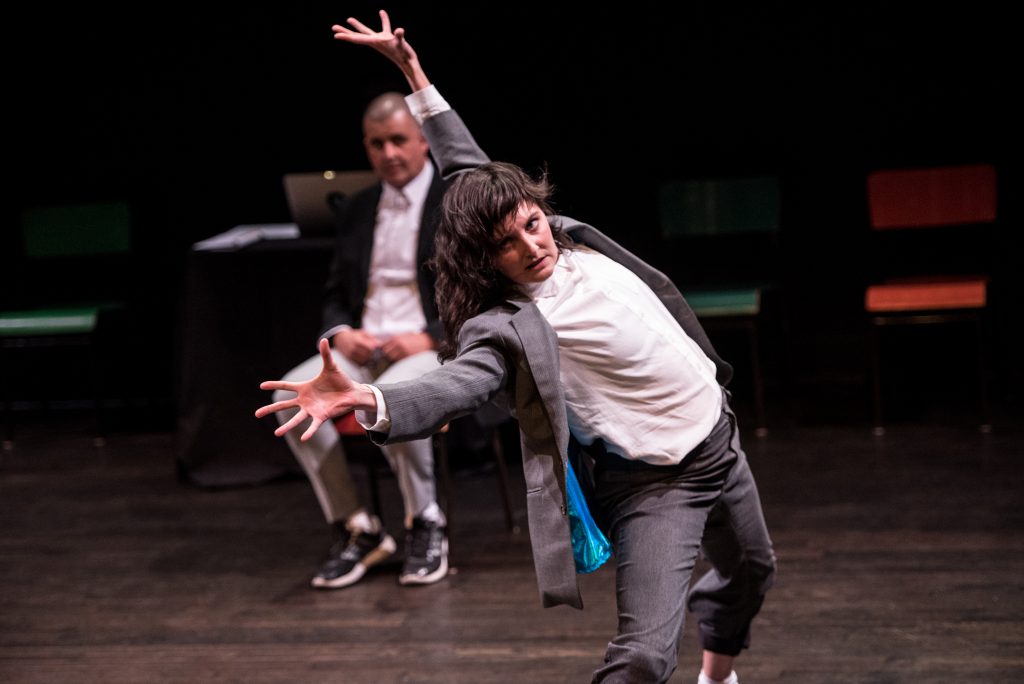
Argument #4:
Even after being swept away by it all and saying how much they have enjoyed my work, I encounter audience members or other theatre artists unfamiliar with dance, or abstraction of any kind, who want to know what the dance means. I usually just ask them what they think it means, or better yet what they saw and how it made them feel. It doesn’t take long for a person to realize that they usually assign their own meaning to the movement.
I usually just ask them what they think it means, or better yet what they saw and how it made them feel. It doesn’t take long for a person to realize that they usually assign their own meaning to the movement.
We are such a language-centric culture that I think we are afraid of anything that defies words to make sense of things. We are uncomfortable with questions that do not have concise answers, or that have mutable answers. We are even more uncomfortable with questions that we will never have an answer to and this is where the body is a truer experience of what we little humans are grappling with.
The body is never certain, it is moving and changing all the time, inside and out, it never lands in “this is it, here it is”. Maybe it moves from “I know this” to “I know this” but it can’t stop to explain.
We suffer when we try to make the body stay put to make sense of it all. You can’t publish the body of work that is dance, you can talk about it like I’m trying to do now but writing it down isn’t it. Maybe this is why dance is sometimes not taken as seriously and is filed under “ephemeral”, “feminine”, “decoration”, or “experimental”.
Conclusion:
We build from what we are in that moment in time, in that body in space. I’d like to tell you that I think a lot about the idea of the “specialized”, the “hybrid”, the “virtuosic” when I’m thinking of performance and my work in particular. I’d like to tell you that I grapple a lot with the questions: Is it dance? Is it theatre? Or that I argue every day that all movement is dance and every organization of forms moving in space is choreography.
But mostly I just go into a room five or six days a week for a few hours and start from improvising and moving around with questions in my head and dance to songs I like and try to find out what’s happening in my body and if it has anything to say. My body always has something to say and my mind usually has something smart to contribute.
If not I do long hand math to recalibrate – it’s true I do.







